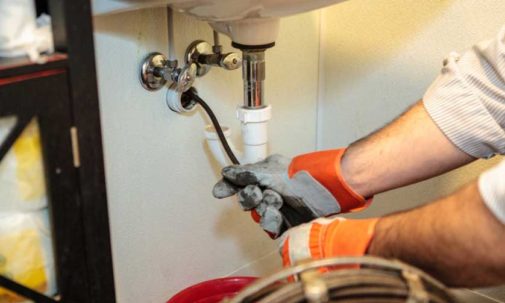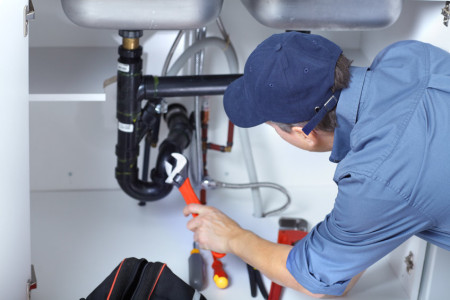We've encountered this post pertaining to Plumbing Emergencies: Tips on What To Do Before below on the internet and accepted it made good sense to discuss it with you on my blog.

Pipes emergency situations can strike at any time, causing stress and possible damages to your home. Whether it's a ruptured pipeline, a stopped up drainpipe, or a leaking tap, understanding exactly how to handle the circumstance up until a professional plumbing arrives can save you from more problems. This write-up gives crucial emergency situation pipes suggestions to assist you reduce damages and restore control during a plumbing situation.
Switch off the Water System
The primary step in any type of plumbing emergency situation is to shut down the supply of water. For localized concerns, such as a dripping tap or commode, switch off the shutoff near the component. In the case of a major leak or burst pipeline, situate your home's major water shut-off shutoff and turn it off right away. Understanding the location of these valves beforehand can conserve beneficial time throughout an emergency.
Shut down Your Hot Water Heater
In certain emergency situations, such as a ruptured pipe, it's important to turn off your water heater. This stops overheating or damages to the system when water quits streaming. Turn off the power supply to the hot water heater (electric or gas) and allow it cool off to avoid prospective risks.
Momentarily Quit a Burst Pipeline
A burst pipeline can lead to substantial water damage in mins. To reduce the concern:
Call a specialist plumbing quickly to deal with the trouble permanently.
Have an Emergency Situation Plumbing Set
Prepare a standard plumbing emergency situation package to deal with small issues efficiently. Your package should consist of:
Having these tools available can make a substantial difference in your ability to handle emergency situations.
Unclog Drains Pipes Securely.
A clogged drain can be an irritating and unpleasant issue. Right here's exactly how to tackle it:.
If these approaches do not function, avoid using excessive force, as it might get worse the clog.
Take Care Of Overflowing Toilets.
An overflowing toilet can cause immediate chaos. Here's what you ought to do:.
Address Little Leaks with Short-lived Repairs.
Small leakages can swiftly become substantial issues if left unattended. Make use of these momentary repairs till expert help shows up:.
While these solutions aren't long-term, they can aid lessen water loss and damages.
Manage Frozen Pipes Very Carefully.
In colder environments, icy pipes are an usual emergency. If you believe a frozen pipe:.
Know When to Call an Expert.
While quick fixes can aid briefly, particular plumbing concerns require prompt professional interest. Call a plumbing technician if:.
Quickly calling a professional makes sure the concern is resolved correctly and avoids further problems.
Avoid Further Damage.
Taking quick action to reduce damages can conserve you money and time in the future. Below's just how:.
Final thought.
Pipes emergency situations can be frustrating, yet with the ideal understanding and devices, you can take care of the situation effectively until assistance shows up. By shutting off the water system, resolving little leaks, and using short-term solutions, you can lessen damage and maintain your home safe. Bear in mind, these ideas are short-term services; always get in touch with an accredited plumbing technician to deal with the origin of the trouble. Preparation and quick thinking are your best allies in any pipes emergency situation.
8 Helpful Tips for Managing Plumbing Emergencies at Home
If your plumbing system hasn’t failed once, wait for it because almost everyone has a story to tell. Sometimes, it could be simple emergencies such as a leaking pipe, a blocked cistern, or even a big burst pipe. In situations like this, you need to have some handy tips to save you some money and from possible damages.
Take care of minor issues early.
Sometimes, you could have avoided an emergency by taking proactive measures while it was still early. Some major plumbing emergencies can be a result of an ignored minor issue. We recommend that you have items like plumbing tapes and other related items. A plumbing tape can allow you to manage minor leaks before the plumber arrives.
Cut off the water supply.
This tip is essential in almost any type of leakage problem. For problems like minor leakages in the toilet or kitchen, turn off the supply that takes water to the affected pipes. If the leakage is a major pipe, you must shut off the supply valve to the entire building. This will help you avoid flooding your home and neighbors if you share a flat.
Know your plumbing system
Folks typically move into a new apartment without understanding the water supply around the building. This can prove disastrous if a water emergency arises and the plumber is far away. The previous tip will prove useless if you don’t practice this one. More importantly, know where your water shut-off valve is located – you’ll need that knowledge to prevent potential home floods.
Have some common handy tools
There are lots of plumbing emergencies that you can handle without hiring a plumber. That’s why you must keep some tools available always. Some tools that you can use to fix simple plumbing emergencies easily include plumbing tapes, screwdrivers, thread seal tapes, plungers, pliers, tape measures, and rubber gloves.
Insulate your pipes from cold
You’ll save yourself from many plumbing expenses if you protect your water pipes from the cold. This is because of the harmful effects that cold weather can have on your pipes. During winter, your pipes can burst from being overly expected to freezing temperatures. So, make sure insulators are there to keep the pipes working correctly.
Avoid practices that will clog your toilet.
Many people indulge in practices that can damage the plumbing system of the entire building. One of these is when they use their toilet to dispose-off garbage. They flush all kinds of things, such as paper towels, bandages, hairs, female sanitary products, etc., down the toilet. This will block your toilet in the long run, incurring unnecessary expenditures. Dump such waste in the trash instead.
Check your dials regularly.
Sometimes, there could be leakages in your home without noticing them in time. So, constantly monitor your water meter dial. If the dial is reading when there is nobody using water, this is an indicator that there is leaking. Check for leaks immediately. Call a plumber as soon as possible if you can’t find any.
https://www.constructionplacements.com/8-helpful-tips-for-managing-plumbing-emergencies-at-home/

As a serious person who reads about Expert Tips for Managing a Plumbing Emergency Until Help Arrives, I figured sharing that section was important. If you liked our post please don't forget to pass it around. Thanks a lot for taking the time to read it.
Schedule An Appointment